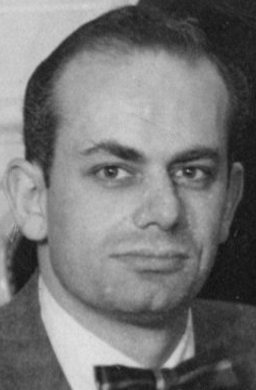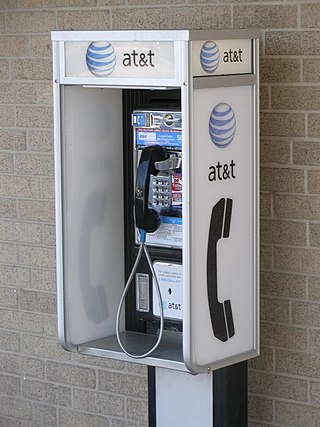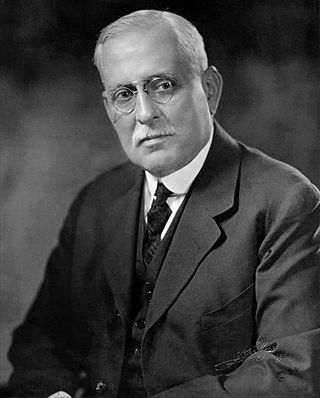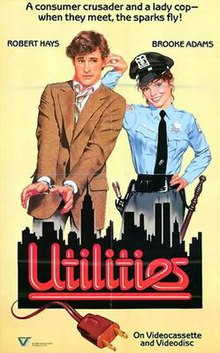
A rotary dial is a component of a telephone or a telephone switchboard that implements a signaling technology in telecommunications known as pulse dialing. It is used when initiating a telephone call to transmit the destination telephone number to a telephone exchange.

Milton "Bill" Finger was an American comic book writer who was the co-creator of the DC Comics character Batman. Despite making major contributions as an innovative writer, visionary mythos/world builder and illustration architect, Finger was often relegated to ghostwriter status on many comics—including those featuring Batman, and the original Green Lantern, Alan Scott.

A payphone is typically a coin-operated public telephone, often located in a telephone booth or in high-traffic public areas. Prepayment is required by inserting coins or telephone tokens, swiping a credit or debit card, or using a telephone card.
Telephone slamming is an illegal telecommunications practice, in which a subscriber's telephone service is changed without their consent. Slamming became a more visible issue after the deregulation of the telecommunications industry in the mid-1980s, especially after several price wars between the major telecommunications companies. The term slamming was coined by Mick Ahearn, who was a consumer marketing manager at AT&T in September 1987. The inspiration for the term came from the ease at which a competitor could switch a customer's service away from AT&T by falsely notifying a telephone company that an AT&T customer had elected to switch to their service. This process gave AT&T's competitors a "slam dunk" method for the unauthorized switching of a customer's long-distance service. The term slamming became an industry standard term for this practice.

Portland General Electric (PGE) is a Fortune 1000, investor-owned energy company based in Portland, Oregon, that generates, transmits and distributes electricity, serving almost two-thirds of Oregon’s commercial and industrial activity. PGE is regulated by the Oregon Public Utility Commission. Founded in 1888 as the Willamette Falls Electric Company, the company has been an independent company for most of its existence, though was briefly owned by the Houston-based Enron Corporation from 1997 until 2006, when Enron divested itself of PGE during its bankruptcy.
Phone fraud, or more generally communications fraud, is the use of telecommunications products or services with the intention of illegally acquiring money from, or failing to pay, a telecommunication company or its customers.

Samuel Insull was a British American business magnate. He was an innovator and investor based in Chicago who helped create an integrated electrical infrastructure in the United States. Insull created holding companies that purchased utilities and railroads. Insull was responsible for the building of the Chicago Civic Opera House in 1929. Due to the Great Depression, his vast Midwest holding company empire collapsed, and he was accused of profiting personally by selling worthless stock to unsuspecting investors who trusted him because of his position and reputation. Following a seven-week trial, he and 16 co-defendants were acquitted of all charges after two hours of jury deliberation.
Commonwealth Edison, commonly known by syllabic abbreviation as ComEd, is the largest electric utility in Illinois, and the primary electric provider in Chicago and much of Northern Illinois. Its service territory stretches roughly from Iroquois County on the south to the Wisconsin border on the north and from the Iowa border on the west to the Indiana border on the east. For more than 100 years, Commonwealth Edison has been the primary electric delivery services company for Northern Illinois. Today, ComEd is a unit of Chicago-based Exelon Corporation, one of the nation's largest electric and gas utility holding companies. ComEd provides electric service to more than 3.8 million customers across Northern Illinois. The company's revenues totaled more than $7 billion in 2023.
Northwestel Inc. is a Canadian telecommunications company that is the incumbent local exchange carrier (ILEC) and long-distance carrier in the territories of Yukon, the Northwest Territories, Nunavut, and part of northern British Columbia and northern Alberta. Originally established in 1979 by the Canadian National Railway from CN's northern telecommunications assets, it has been owned by BCE Inc. since 1988.

The Public Utility Holding Company Act of 1935 (PUHCA), also known as the Wheeler-Rayburn Act, was a US federal law giving the Securities and Exchange Commission authority to regulate, license, and break up electric utility holding companies. It limited holding company operations to a single state, thus subjecting them to effective state regulation. It also broke up any holding companies with more than two tiers, forcing divestitures so that each became a single integrated system serving a limited geographic area. Another purpose of the PUHCA was to keep utility holding companies engaged in regulated businesses from also engaging in unregulated businesses. The act was based on the conclusions and recommendations of the 1928-35 Federal Trade Commission investigation of the electric industry. On March 12, 1935, President Franklin D. Roosevelt released a report he commissioned by the National Power Policy Committee. This report became the template for the PUHCA. The political battle over its passage was one of the bitterest of the New Deal, and was followed by eleven years of legal appeals by holding companies led by the Electric Bond and Share Company, which finally completed its breakup in 1961.

The California Public Utilities Commission is a regulatory agency that regulates privately owned public utilities in the state of California, including electric power, telecommunications, natural gas and water companies. In addition, the CPUC regulates common carriers, including household goods movers, limousines, rideshare services, self-driving cars, and rail crossing safety. The CPUC has headquarters in the Civic Center district of San Francisco, and field offices in Los Angeles and Sacramento.

Frontier Communications Parent, Inc. is an American telecommunications company. Known as Citizens Utilities Company until 2000, Citizens Communications Company until 2008, and Frontier Communications Corporation until 2020, as a communications provider with a fiber-optic network and cloud-based services, Frontier offers broadband internet, digital television, and computer technical support to residential and business customers in 25 states. In some areas it also offers home phone services.
The Alabama Public Service Commission, commonly called the PSC, was established by an act of the Alabama Legislature in 1915 to primarily replace the State Railroad Commission. The PSC's responsibility was expanded in 1920 to include regulating and setting rates that utility companies charge their customers for electricity. The legislature expanded the PSC's responsibilities in later years to include those companies that provide gas, water, and communications, as well as transportation common carriers such as trucking and air carriers. The PSC effectively determines the rate of profits that most of these companies are allowed to earn. However, some of its traditional responsibilities have passed to the federal government with the passage of the Federal Aviation Act of 1994 and the Federal Communications Act of 1996.

The Public Utility Commission of Texas is a state agency that regulates the state’s electric, water and telecommunication utilities, implements respective legislation, and offers customer assistance in resolving consumer complaints.
Christmas Night with the Stars was a television show broadcast each Christmas night by the BBC from 1958 to 1972. The show was hosted each year by a leading star of BBC TV and featured specially-made short seasonal editions of the previous year's most successful BBC sitcoms and light entertainment programmes. Most of the variety segments no longer exist in accordance with the BBC's practice of discarding programmes at the time.
The Georgia Public Service Commission (PSC) is a statutory organ of the state government of Georgia; elected among five commission districts, the board consists of a Chairman, a Vice-chairman, and three Commissioners. PSC regulates telecommunications, transportation, electric and natural gas services in the U.S. state of Georgia. Commissioners are elected in partisan elections statewide, though they must reside in a district.
The Indiana Utility Regulatory Commission (IURC) is the public utilities commission of the state of Indiana, led by five commissioners appointed by the governor.
The Public Service Commission of West Virginia is the Public Utilities Commission of the State of West Virginia, U.S.A.

Peterloo is a 2018 British historical drama, written and directed by Mike Leigh, based on the Peterloo Massacre of 1819. The film was selected to be screened in the main competition section of the 75th Venice International Film Festival. The film received its UK premiere on 17 October 2018, as part of the BFI London Film Festival, at HOME in Manchester. The screening marked the first time that the festival had held a premiere outside London. Leigh said he was delighted that Peterloo would be premiered "where it happened".










